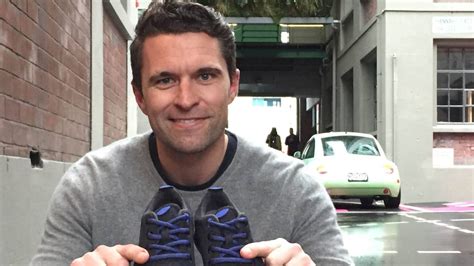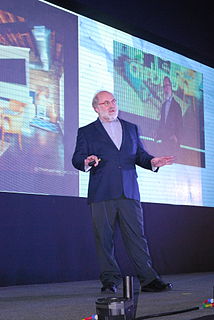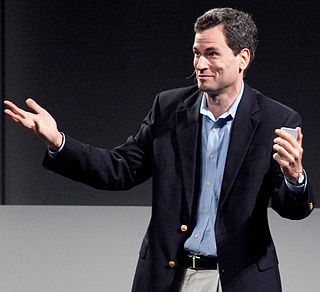Ein Zitat von Tim Brown
Wir befinden uns an einem kritischen Punkt, an dem der schnelle Wandel uns dazu zwingt, nicht nur nach neuen Wegen zur Problemlösung zu suchen, sondern auch nach neuen Problemen, die es zu lösen gilt.
Verwandte Zitate
Mir wurde nur sehr früh beigebracht, dass ich auf einen sehr dunklen Weg zusteuerte, wenn ich Probleme nicht löste. Probleme gab es überall. Selbst wenn es keine Probleme gibt, suche ich nach Problemen. Ich frage mich: ‚Weißt du was? Mir gefällt die Funktionsweise dieses Löffels nicht. „Ich möchte einen neuen Löffel entwerfen.“
Probleme zu lösen ist in Ordnung, aber es ist mittlerweile zu einer globalen Obsession geworden. Irgendwie haben wir das Gefühl, dass wir uns zurücklehnen und das einfache Leben genießen können, wenn wir alle Probleme lösen. Aber in Wirklichkeit werden wir faul und selbstgefällig. Und dann werden wir mit noch größeren Problemen überschwemmt.
Die Technologien, die am erfolgreichsten sein werden, werden das menschliche Verhalten widerspiegeln, anstatt ihm entgegenzuwirken. Um die Probleme der Bereitstellung und Integration neuer Technologien am Arbeitsplatz zu lösen, müssen wir tatsächlich auf die Art und Weise achten, wie Menschen handeln und reagieren. In den letzten 20 Jahren hat die US-Industrie mehr als 1 Billion US-Dollar in Technologie investiert, konnte jedoch kaum Verbesserungen bei der Effizienz ihrer Wissensarbeiter und praktisch keine Verbesserungen bei deren Effektivität feststellen. Wenn wir die Probleme der Integration neuer Technologien lösen könnten, wäre das Potenzial enorm.
Ich hoffe, dass Design Thinking zu einer innovativen Disziplin wird und nicht nur zum Trend des Jahrzehnts. Als Nation und weltweit müssen wir einige der größten Probleme lösen, mit denen wir je konfrontiert waren. Wir brauchen innovative Wege, um unsere Probleme zu lösen, und die Kommunikation der Lösungen wird von größter Bedeutung sein. Originelles Denken, komplexe Problemlösungen und Zusammenarbeit sind wichtige Fähigkeiten für unsere Zukunft.
Die meisten Menschen definieren Lernen zu eng als bloßes „Problemlösen“, sodass sie sich darauf konzentrieren, Fehler in der externen Umgebung zu erkennen und zu korrigieren. Es ist wichtig, Probleme zu lösen. Doch damit das Lernen anhält, müssen Führungskräfte und Mitarbeiter auch nach innen blicken. Die Notwendigkeit, das eigene Verhalten kritisch zu reflektieren, herauszufinden, wie sie oft unbeabsichtigt zu den Problemen der Organisation beitragen, und dann ihr Verhalten zu ändern.
Was ist Innovation, wenn nicht unsere Eintrittskarte für jedes Geschäftsinteresse auf der Welt? Es ist die Eintrittskarte zur Lösung der Weltprobleme – der Energieprobleme, der Umweltverschmutzungsprobleme, der Probleme der globalen Erwärmung. Wie werden wir in der neuen Welt konkurrenzfähig sein, wenn es nicht um Wissenschaft und Technik geht?
Was ist Innovation, wenn nicht unsere Eintrittskarte für jedes Geschäftsinteresse auf der Welt? Es ist die Eintrittskarte zur Lösung der Probleme der Welt – der Energieprobleme, der Umweltverschmutzungsprobleme, der Probleme der globalen Erwärmung. Wie werden wir in der neuen Welt konkurrenzfähig sein, wenn es keine Wissenschaft und Technik gäbe?
Das Lösen von Problemen ist eine praktische Fähigkeit wie beispielsweise Schwimmen. Wir erwerben jede praktische Fähigkeit durch Nachahmung und Übung. Beim Versuch zu schwimmen ahmt man nach, was andere mit Händen und Füßen tun, um den Kopf über Wasser zu halten, und lernt schließlich schwimmen, indem man das Schwimmen übt. Beim Versuch, Probleme zu lösen, muss man beobachten und nachahmen, was andere Leute tun, wenn sie Probleme lösen, und schließlich lernt man, Probleme zu lösen, indem man sie tut.



































